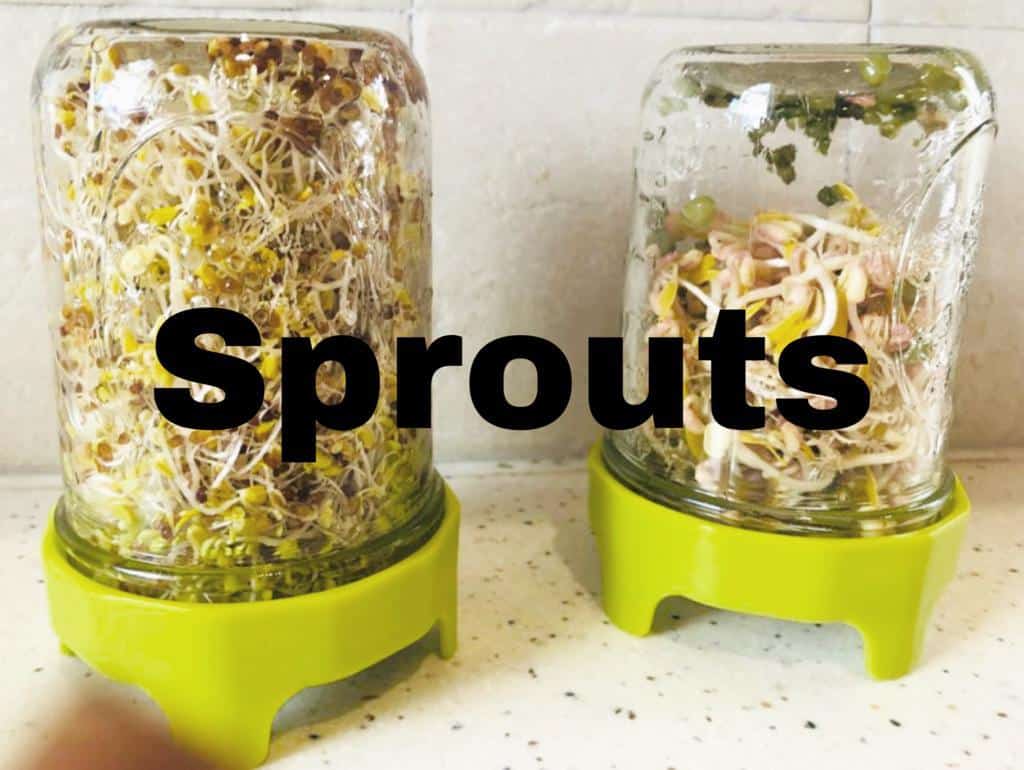Sprouting Seeds is the process of germinating seeds and grains, and eating them or using them in cooking. Many people think that sprouting seeds is complicated, but it’s actually quite simple. You don’t need special equipment or skills to grow your sprouts at home.

All you need are a few basic ingredients and a little time. The process of organic sprouting seeds can be broken down into three easy steps: soaking the seeds overnight, draining, rinsing, and repeating until they reach their desired size.
Sprouts are full of nutrients that are easily digestible and are therefore highly recommended for those with weak digestion. Sprouting is also an ancient practice that has been used by many cultures throughout history. If you’re not familiar with how to sprout house seeds, don’t worry. We’ll cover everything you need to know here.
Why people love Sprouts
Sprouts are a great source of protein and enzymes, which is why they’re often used in raw food diets. Protein is important for building muscle and creating enzymes that aid digestion. While most foods contain some kind of protein, none come close to the amount found in sprouts. A cup of alfalfa sprouts has 20 grams more than any other food.
Enzymes are also important for digestion because they help make it easier for your body to break down nutrients from the food you eat so that you can absorb them into your bloodstream.
History of Sprouting Seeds
The history of organic sprouting seeds is a long and varied one. The practice has been around for thousands of years, with evidence dating back to ancient China and India. In the middle Ages, monks would spread the word about the health benefits of sprouted seeds through their work in the monasteries. In modern times, Dr. John Harvey Kellogg (of Corn Flakes fame) promoted the consumption of sprouts as part of his holistic diet philosophy at his sanitarium in Battle Creek, MI.
Most commonly seeds used for sprouting
Fenugreek
Fenugreek is a plant that is used in cooking and has been used as a spice for centuries. Fenugreek has a bitter taste, making it ideal for curries, rice dishes, and green lentil dishes. Fenugreek has been used for thousands of years as both a spice and a medicine. It has also been shown to have many effective health benefits including lowering blood sugar levels in people with diabetes mellitus type 2 (DM2).
Broccoli sprouts
Broccoli sprouting seeds are a good source of vitamin C, as well as vitamin A and vitamin K. They contain phytonutrients that have anti-cancer properties.
Mung Beans Sprouts
Mung beans are the most commonly used sprouted seed. They are easy to grow, have a mild flavor, and are high in protein. In addition to being delicious, mung bean sprouts are also a good source of vitamins A, C, and K.
Alfalfa
Alfalfa sprouts are the most commonly used type of sprouts. They are usually green and have a small, cylindrical shape. Alfalfa sprouts can be eaten in a variety of ways including raw or lightly steamed as part of a salad mix or sandwich. Alfalfas also have many health benefits, they’re high in protein and calcium and contain vitamins A, C, and K, among others.
Radish sprouts
Radish sprouts are also a great choice for salads. These tiny plants help to boost your immune system, making radish sprouts useful in the prevention and treatment of colds and other illnesses. You can even eat these tasty little greens straight out of the jar, they have a peppery taste that will add an interesting kick to any dish. As with any other kind of sprout, it’s important not to cook radish seeds for longer than five minutes or they may become bitter tasting.
Red clover
The health benefits of red clover are quite impressive. It is a good source of many vitamins, minerals, and nutrients. Red clover can be used as a substitute for alfalfa sprouts because it has similar nutritional qualities. Some of the benefits include:
• Good source of vitamins A, B1, B2, B3, and C.
• Provides calcium which is important for healthy bones.
• Contains antioxidants that help fight free radicals in the body.
• High in potassium which helps maintain cardiovascular health.
Best way to store Sprouts
Put the sprouts in a container with plastic wrap on it. To promote ventilation, poke a few tiny holes in the plastic. You can choose to put your sprouts in a plastic bag if they are completely dry, but an airtight closure will probably reduce the length of time the sprouts will stay fresh.
How long can sprouts be preserved?
Sprouts should be consumed as soon as possible because they are highly perishable, but there are various techniques to increase their shelf life. The majority of sprouts can be stored in a plastic bag in the refrigerator’s crisper for up to 3 days. Alfalfa and other delicate sprouts should be stored in the original ventilated plastic container in the refrigerator.
Interesting benefits of Sprouting
Aids in the digestion process
Sprouts contain a high amount of enzymes, which are proteins that help break down food. Enzymes assist in the digestion process by helping our body to absorb nutrients from food. Without them, we would be unable to digest our meals and absorb the nutrients they contain. Sprouts are also a good source of vitamin B6, which is essential for the production of many enzymes in our bodies. Vitamin C is needed for the absorption and utilization of iron found in plants such as soybeans and alfalfa sprouts.
Reduces body weight

One of the best foods to help you lose weight is sprouts. Since they are low in calories and high in nutrients, you can consume them without worrying about gaining weight. Additionally, sprouts have a high fiber content, which prolongs your feeling of fullness and prevents the release of the hunger hormone ghrelin.
Stimulates blood flow
Sprouting stimulates blood flow to the seeds, increasing their bioavailability. Sprouts are rich in iron and zinc, which both help transport oxygen around your body. Zinc is also a cofactor for many enzymes involved in metabolism, including DNA repair and protein synthesis. The B vitamins in sprouts also aid these processes by helping convert food into energy.
Enhances Vision
Sprouting is a great way to help reduce the risk of cataracts, age-related macular degeneration, and glaucoma.
• Vitamin C is increased in sprouts by up to 100%. This vitamin is necessary for our eyesight because it helps prevent free radical damage that can be caused by UV rays. It also protects against cataracts, which can cause blurry vision or blindness if they are not treated early enough.
• Lutein, zeaxanthin, and beta-carotene are all present in large quantities when you sprout your seeds. These three nutrients have been shown to protect against age-related macular degeneration (AMD), which causes blurry vision or even total blindness if left untreated.
Encourages Hair Growth
Another benefit of eating sprouts is that they increase blood circulation to the scalp, which contributes to healthy hair growth. Hair loss occurs when your body experiences an imbalance in hormones, so eating foods like sprouts can prevent this from happening. Plus, increased blood flow also encourages hair growth by bringing nutrients to the follicles.
Favorable to the heart health

Sprouting is also beneficial for your heart. The fiber content in sprouts makes them very good at lowering cholesterol levels, as well as preventing heart disease. The antioxidants found in sprouts help to prevent oxidative damage from free radicals, which can lead to heart disease.
Minerals such as potassium and magnesium also play a role in promoting good health. They help keep blood pressure down and maintain electrolyte balance so that fluid is not retained within the body tissue, which could increase the risk of stroke or heart attack.
This means that growing sprouts are an excellent source of all nutrients necessary for healthy blood pressure regulation including potassium, magnesium, vitamin E (natural antioxidant), riboflavin (vitamin B2), thiamine (vitamin B1) folate (folic acid), etc.
Helps to avoid Anemia
A common issue that can cause anemia is iron deficiency. If you have anemia, you could have symptoms including nausea, lightheadedness, dizziness, stomachaches, and more. If you suffer from anemia, including sprouts in your diet is a great way to help treat the condition.
Sprouting mix helps boost your consumption of green leafy vegetables, which are rich in iron and other nutrients that support healthy red blood cell production. This can be especially beneficial for those who may have trouble absorbing iron from their diet or who don’t consume enough leafy greens on a regular basis.
Boost Your Immune System
Sprouts are a potent immune system booster because they are rich in vitamin C, which boosts the activity of white blood cells and helps the body fight infections. Additionally, they are rich in vitamin A, an excellent antioxidant and immune system booster. When sprouts are allowed to germinate or develop for more than a week after their original appearance, the vitamin A content of the sprouts increases up to tenfold. For the greatest health advantages, make sure to cultivate them properly.
What are the healthiest sprouting seeds?
Alfalfa, broccoli, mung bean, and radish sprouts are some examples of healthiest sprouts that are great providers of antioxidants, necessary amino acids, and a variety of nutritional vitamins and minerals. Consequently, sprouts have been classified as functional foods that promote health and lessen the risk of a variety of disorders.
How do you sprout seeds?
Sprouting seeds is easy and certified organic. All you need is a jar and a few tablespoons of seeds. Rinse them with water, then soak overnight in the jar. Drain the water and rinse again twice daily until they begin to germinate (usually within 3 days). Once they’ve sprouted, move your sprouts to fresh water at least once a day or more often if you’re growing guide them indoors or in warm conditions and prepare as desired.
Can I use normal seeds for sprouting?
Yes, you can use normal seeds for sprouting. However, they will take longer to germinate than the seeds you buy specifically for sprouting. However, you must confirm that the seed mix has not undergone chemical treatment. If a seed takes longer to germinate, it means that it has not been treated with chemicals or preservatives and is therefore likely to be healthier for you.
How to sprout seeds in a jar?
• Put the seeds in a jar with water.
• Place the container of seeds in a dark place, this will make it easier for sprouts to appear.
• Cover the jar with a cloth or paper towel.
• Sprouts should appear in about 2 days ‘ in quick view.
• Eat sprouts after about 1 week, then rinse them before eating them.
Do sprouting seeds need sunlight?
The majority of seeds germinate best in the absence of light, and some may even be prevented by it. Some species (such as Begonia, Primula, and Coleus) require light to germinate. Contrast seed light requirements with those of seedlings. Light is necessary for all seedlings.
Join our growing community of friends and family on the Something Better Today FaceBook page.
https://studio.youtube.com/video/l6BfTacEiB0/edit
Ingredients
No ingredients could be found for this recipe.
Instructions
No instructions could be found for this recipe.

Leave a Reply